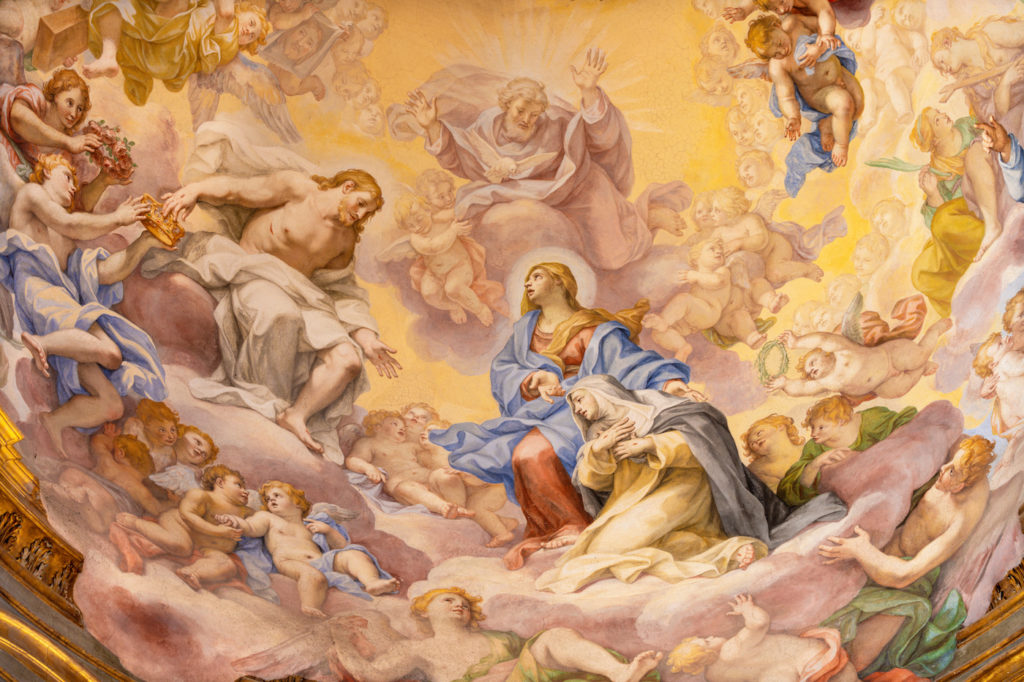Last fall, Harvard University’s campus ministry program landed a story in the New York Times. They had elected Greg Epstein, the chaplain of the Humanist group, as the president of Harvard’s chaplaincy office. Outrage ensued at the prospect of an atheist leading the campus ministry at a university founded to be a seminary.
Meanwhile, at the Collegium Institute for Catholic Thought and Culture, in the University of Pennsylvania community, a new program has emerged, and it’s based on a different kind of “humanism.” Last fall, the Institute (where I work) launched its Catholic Humanism Fellowship. While we did not get an article in the Times, these two events are important and related. At Collegium, we are trying to give students an encounter with a humanism different from that found in classrooms of elite secular universities. Secular humanism doesn’t consider the meaning of being human. Catholic humanists, by contrast, offer a vision centered on God and disclosed in the person of Christ.
Humanism’s Contested Meaning
While the media coverage of the humanist chaplain focused on the oddity of an atheist leading a chaplaincy office, people did not dispute the idea that atheists, agnostics, and “nones” have an unequivocal claim on the title Humanist. But the concept has long been contested. Erasmus and St. Thomas More would be surprised to find that the head of the Humanists was not a committed Catholic. The term humanist is disputed because what it means to be a human is itself disputed. But much of the secular world has forgotten this dispute.
Start your day with Public Discourse
Sign up and get our daily essays sent straight to your inbox.When the bishops at Vatican II promulgated Gaudium et Spes—the essential explication of the Church’s teaching on the human person—they saw that the confusion over humanism was particularly acute in our time. While contemporary humanists could agree that “all things on earth should be related to man as their center and crown,” they couldn’t agree on the nature of humanity. The bishops saw that we needed to ask anew: “What is man?”
Much of modern life avoids asking this question, as we see in the default assumption that humanism is secular and in the decline of the study of the humanities. Today’s humanism leaves us with no clear sense of what it means to be human. Are we best understood only in reference to ourselves? Or are we best understood in relation to God? Is humanism anthropocentric or theocentric?
Much of modern life avoids asking about human nature, as we see in the default assumption that humanism is secular and in the decline of the study of the humanities.
The contention between a secular humanism and a Catholic humanism involves the direction of our thinking and of our lives. It’s also a debate about where humans look for guidance and meaning. Secular humanism doesn’t look beyond the self; it is a self-referential philosophy of life. We can see this in the debate between Protagoras and Plato, the original debate between secular humanists and religions humanists. For Protagoras, “man is the measure of all things.” When looking for answers, look to man.
Plato was not impressed. For him, there was no way to understand humanity (or reality for that matter) without divinity. “Not man,” he proclaimed, “but God is the measure of all things.” For Plato, we must look to the divine to understand ourselves. The essential direction of theocentric humanism is up. To be human is to be in relation to the eternal, the universal, the divine. Plato understood this, and his insights—along with those of Aristotle, Plotinus, the Stoics, and others—have provided thousands of years of reflection.
However, classical, theocentric humanism is not yet Catholic. While it influences the ethical vision of Christian traditions—especially the natural law tradition—it runs the risk of degrading the human. Plato certainly upholds human worth, but he also describes us as hardly real and as the gods’ puppets, toys, and chattel. A humanism that only looks up can forget about those who do the looking. It can end up so other-worldly that it is no longer recognizably human.
By contrast, the Jewish and Christian traditions insist that God looks at us too. To read the Old Testament is to find testimony after testimony of God’s everlasting care of us. When we fail to look to Him, and fail to care about His edicts, God responds with an ever deeper care for us. The God we find in scripture is a God bending down to us. Proverbs expresses this beautifully. Wisdom (who for Christians is the Second Person of the Trinity) delights in relation to God. Wisdom’s delight in the divine leads Wisdom to also “delight in the human race.” Not only does God notice us and care for us, God delights in us. In Psalm 8, we find the psalmist filled with wonder at this. He prays, “What is man that You should keep us in mind? Mortal persons that you care for us?” If Plato depicts a humanism deeply concerned with divinity, the psalmist portrays a God deeply concerned with humanism.
This bidirectionality is essential for a Catholic humanism. It is not just that we look to God, God looks to us. Neither secular humanism nor classical theocentric humanism can conceive that God so loved the world. Augustine perceived this paradigmatic shift in going from Plato to Christ. In his Confessions, Augustine finds God in Platonist texts, but God did not find him there. “I did not read in those books [of the Platonists] that the Word became flesh. … [T]hese books did not tell me that He emptied himself, taking the form of the servant. … I did not read that He died for the ungodly.” Augustine found in Christianity a God who cares for us, who keeps us in mind, who delights in us. God loves humanity so much that He dwelt among us. The heart of Catholic humanism is the realization that God has a heart for us.
Augustine found in Christianity a God who cares for us, who keeps us in mind, who delights in us. The heart of Catholic humanism is the realization that God has a heart for us.
An Education in Catholic Humanism
Gaudium et Spes saw the wisdom of humanists who celebrate humanity, but the bishops also saw that a humanism without God was inadequate and could too easily devolve into an anti-humanism. Humanity “often exalts itself as the absolute measure of all things or debases itself to the point of despair.” Why this strange pivoting between self-exaltation and self-debasement? It stems from our self-referentiality. A ruler that only measures itself can never actually measure itself. It’s simultaneously too much and too little for itself.
Self-understanding comes through relationship; it sees that we must measure up to something greater than ourselves. The answer to the question of man, the path to understanding the divine standard, the fundamental expression of God’s concern with us lies in Christ. In Christ, our relationality is disclosed to us. The bishops taught that:
Only in the mystery of the incarnate Word does the mystery of humanity take on light. … Christ fully reveals man to man himself and makes his supreme calling clear. … He Who is “the image of the invisible God” is Himself the perfect human.
There is no humanism that is true to humanity without Christ, who reveals that we are made in the image of God and restores that image within us.
This Christocentric humanism should form the heart of any Catholic intellectual or educational endeavor. We can only understand humanity by understanding Christ, the true man. Grounded in the sense that we must look to God because God looks to us, we ought to explore the human person in relationship. For Augustine, God is “more intimately present to me than my innermost being, and higher than the highest peak of my spirit.” Our task then is to understand God and man, the Lord above us who is the Lord within us. To see this, I want to close with a few essential facets of an education in Catholic humanism.
First, to take seriously Catholic humanism is to begin with the realization of the deep inadequacy of secular humanism. For the novelist Walker Percy, secular humanism is not just wrong, it is wholly inadequate to the richness and strangeness of this life. As an answer to the question of existence, it is, as he puts it, “a poor show.” It just misses too much about his life. He writes, “Life is a mystery, love is a delight; … one should settle for nothing less than the infinite mystery and the infinite delight, i.e., God.” So many young people have been trained to settle for something less; Catholic humanism should open the “more” of human life to them.
Second, Catholic humanism understands that God delights in us. A Catholic education takes the love between God and humanity seriously and centers its inquiry on it. Augustine pondered his love for God, and so should we. But we should also ponder why God, as Catherine of Siena puts it, “fell in love with us.” To really understand the human person, we must contemplate the character of the love between God and His human creatures.
Third, such an education should inculcate a concern for those Bartolomé de las Casas calls the “smallest and the most forgotten.” The knowledge that God remembers us should lead us, in turn, to remember those our society forgets: the unborn, the poor, the sick, and the elderly. God is the measure of all things and God chose the lowly to humble the proud. Like God, we should turn in mercy and justice to the least of us.
Finally, Catholic humanism directs us to contemplate the good, the true, and the beautiful. To understand the human person is to understand these three principles and how they attract our will, our intellect, and our attention. Collegium’s Catholic Humanism Fellowship centers on these three realities, considering our life as a pilgrimage to the good, a pursuit of truth by being true to reality, self, and others, and an endless attraction to the manifold beauties that point us to the true beauty of God. Such an education plays out in a consideration of the texts and questions in dialogue with each other. It involves artists like Fra Angelico and Ivanka Demchuk, poets like Gerard Manley Hopkins and Claude McKay, theologians such as Hildegard and Benedict XVI, and saints from Mary to Dorothy Day.
Catholic humanism will be approached in different ways in different schools and institutes. But study and worship of God, who makes us central to His care and delight, must be the centerpiece of any such program. One thousand eight hundred years ago, Irenaeus captured the heart of Catholic humanism: “The glory of God is man fully alive, but the life of man is the vision of God.” The task of Catholic education is to renew this vision of infinite mystery and infinite delight, of an attention to the God who pays attention to us, of a humanism centered on the Divine.













